Best CBD Cream for Eczema Reviewed of 2023
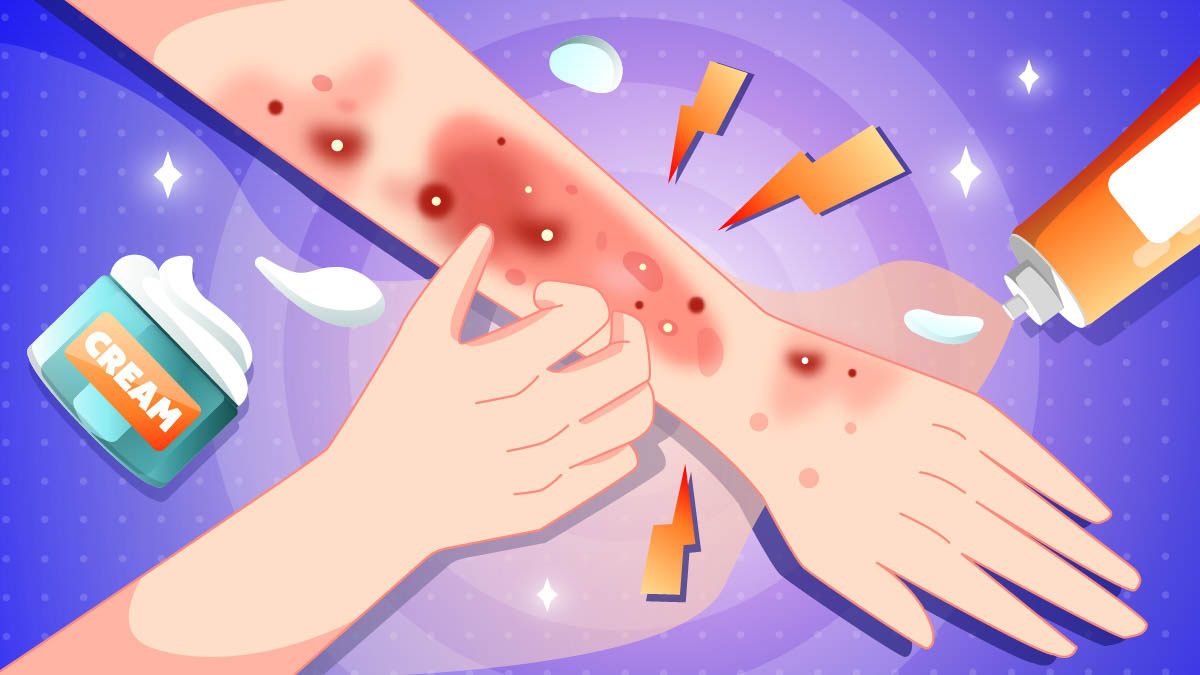
If you’ve already tried conventional solutions for eczema but to no avail, CBD cream is probably high on your list of last resorts.
CBD creams are anti-inflammatory, moisturizing, and nourish your skin from within – replenishing its natural protective barrier.
The reason why CBD cream may be effective for eczema is its interaction with the human endocannabinoid system (ECS).
The ECS is a complex neurochemical network that maintains homeostasis throughout the body.
But how do you pick the best CBD cream for eczema?
What ingredients should you look for, and which are best avoided?
Here are the best CBD products for eczema that you can buy online.
CBD and Eczema: Highlights
- Eczema is a very common skin condition that causes itchiness, dryness and cracking of the skin.
- There are three main types of eczema: contact dermatitis, exfoliative dermatitis, and nummular dermatitis.
- Eczema can be caused by stress, hormone changes, low levels of nutrients, or allergies.
- Topical eczema treatments, such as antibiotics and corticosteroids, fail to produce long-term relief from the condition despite some short-term success. They also have nasty side effects, such as the weakening of one’s immune system.
- CBD is a natural compound from cannabis that can support healthy skin by interacting with the endocannabinoid system (ECS).
- The health benefits of CBD for eczema include reduced inflammation, less itching, reduce redness, and better moisturization.
- CBD creams are safe for eczema. They won’t get you high and don’t involve any dangerous side effects.
- That being said, CBD can cause a few mild reactions when taken too much, such as dry mouth, changes in appetite, diarrhea, and fatigue. However, these are usually non-existent when you apply CBD to the skin.
- Consult your dermatologist before buying CBD cream near you; CBD is known to interact with many pharmaceutical medications, creating the risk of cross-drug interactions and side effects.
Best CBD Cream for Eczema
1. Royal CBD
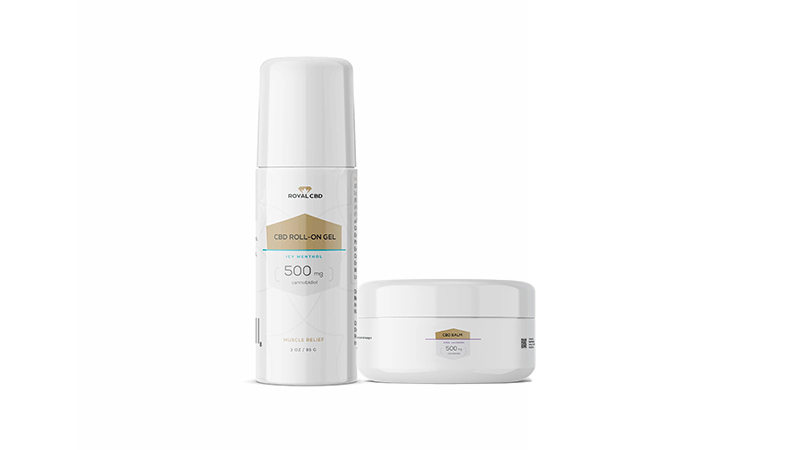
Get 15% off all Royal CBD products. Use code “CFAH” at checkout.
| Pros | Cons |
|
|
Royal CBD comes from Nevada and specializes in full-spectrum and broad-spectrum CBD products from organic hemp grown in Colorado.
The company offers two topicals: a CBD Cool Relief Cream and Pain Freeze Roll-on Gel.
Both products contain broad-spectrum CBD, allowing you to reap the benefits of the supportive cannabinoids and terpenes – but without any THC in the formula.
The cream is infused with menthol, providing an extra relief layer with its cooling touch. The product absorbs well and doesn’t leave a greasy feeling on the skin. Making the cream one of the best CBD creams for pain.
It does, however, have a grainy texture, so it may not be the most pleasant application in your life. But then again, it’s a sign the cream is made with all-natural botanicals — all the better for skin with eczema.
2. Gold Bee
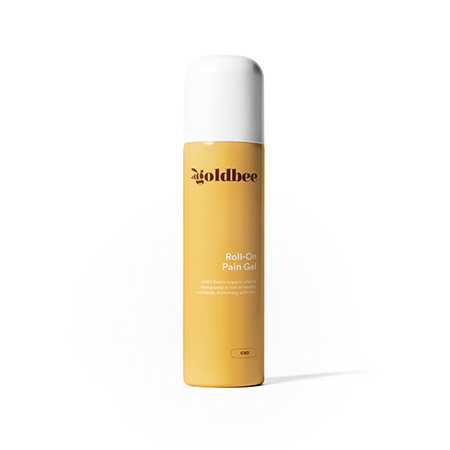
| Pros | Cons |
|
|
Gold Bee is known for making some of the best all-organic CBD products, including its high-strength Pain Freeze Roll-on Stick which is one of the best CBD roll-ons. You can use it for eczema if you need high doses of CBD in your routine.
There’s 2,000 mg of broad-spectrum CBD per stick. On top of that, the gel is infused with organic menthol crystals that literally give a freezing sensation to the affected area.
If you’re itching and burning from your eczema flare-ups, the Gold Bee CBD Roll-on stick may come in handy with such a hefty dose.
Similar to Royal CBD, Gold Bee tests each product batch in a third-party laboratory for potency and purity.
Can CBD Cream Help with Eczema?
Although there have only been a few studies conducted on CBD use for eczema, all of them have brought promising results.
For example, in one 2019 study, the subjects used a topical CBD ointment on their skin twice daily for 3 months. After this period, all participants reported improvements in their skin inflammation.
The authors concluded that CBD topicals (without any THC) are safe and effective and proposed them as a noninvasive alternative for treating inflammatory skin conditions such as eczema.
According to a small observational 2020 study, where participants with self-reported eczema used CBD cream, 50% of the subjects reported that their condition improved by more than 60%.
The best part about using CBD for eczema is the number of symptoms it can address.
Here’s what studies are saying about CBD’s efficacy for rashes, itching, and skin inflammation.
CBD Cream for Rash and Itching
A 2020 study that experimented with using CBD cream for eczema – and reviewed other studies in this area – found that CBD has remarkable anti-inflammatory and antipruritic benefits when applied topically.
The authors agreed that topical CBD resulted in “significant improvement in itch, as measured with VAS-pruritus and 5-D scale.”
The research team also concluded that the aforementioned benefits contribute to epidermal barrier restoration.
CBD for Dry Skin
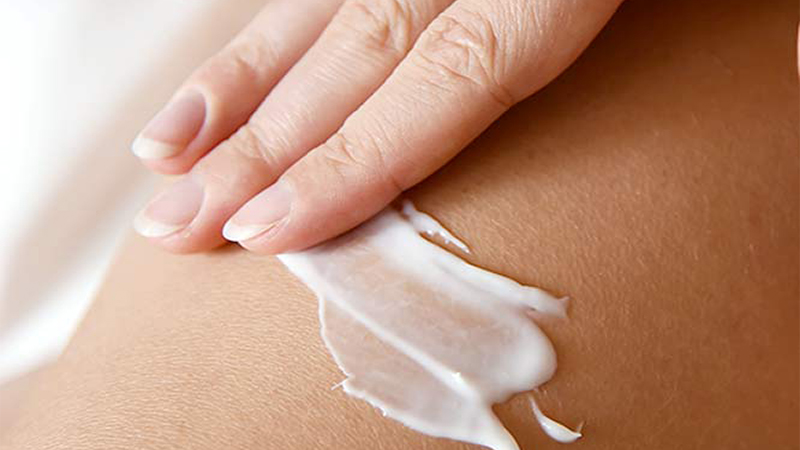
A 2019 study reported that CBD might be useful for relieving some common symptoms of skin conditions, such as dryness and itching.
Again, the authors pointed to the anti-inflammatory and skin-protective properties of CBD.
As CBD cream can help soothe skin and curb irritation, it’s one of the best options for people with sensitive skin and eczema.
CBD creams contain a solid fat base, usually from hemp oil and coconut oil, both of which are remarkable moisturizers. Their effects, combined with the therapeutic properties of CBD, can contribute to healthier, younger, and softer skin.
CBD for Infection
Scratching eczema flare-ups creates the risk of secondary infections.
CBD creams contain potent antioxidants that also act as antibacterial and antifungal agents – thus making them useful for treating skin infections.
CBD can even potentiate the effects of common antibiotics in treatment-resistant infections.
Is CBD Cream Better than Hemp Lotion for Eczema?
Hemp lotion and CBD cream are completely different products.
Hemp lotion usually contains hemp seed oil, not CBD oil. Hemp seed oil doesn’t contain any cannabinoids, terpenes, and flavonoids – all of which are desired in creams for eczema sufferers.
It does, however, offer significant moisturizing properties, so you can combine CBD cream and lotion for your anti-eczema routine.
Use hemp lotion as a daily care product to improve the general condition of your skin.
Follow up with CBD cream for eczema flare-ups.
What to Look for in a CBD Eczema Cream
The best CBD creams for eczema are made with organic ingredients. Since these botanicals are derived from plants, it’s critical that they’re free from pesticides and heavy metals. That’s because these toxins usually pass into the final product when extracted from contaminated plants.
If you want to make sure you’re getting a legitimate CBD cream – not an overpriced cream infused with hemp-seed oil – always look for batch-specific certificates of analysis (CoAs).
These certificates contain reports about the potency of CBD, the product’s cannabinoid and terpene profile, and results for the aforementioned contaminants (plus mold and residual solvents).
Ingredients That May Boost the Efficacy of CBD Cream for Eczema
You can choose from a plethora of different formulas when it comes to CBD creams for eczema. The best ingredients for the job include:
- Menthol: this ingredient is irreplaceable for reducing the sensation of pain and irritation on the skin. It enhances the analgesic properties of CBD.
- Vitamin E: this vitamin has been shown to improve eczema extent, itching, and other markers of eczema in studies.
- Colloidal oatmeal: a review of studies found that topicals infused with colloidal oatmeal improved itching, dryness, eczema severity, and overall quality of life in the subjects.
- Manuka honey: this special kind of honey is farmed in New Zealand and has been demonstrated to improve eczema in studies.
- Aloe vera: aloe gel is proposed to have antibacterial and wound-healing properties. It can also modulate the functioning of the immune system. However, there are no direct studies examining its effectiveness for eczema.
- Coconut oil: some eczema patients praise coconut oil for its ability to reduce skin inflammation and improve skin barrier function.
- Emollients/moisturizers: moisturizing the skin is one of the best ways to treat eczema because it helps replenish the skin barrier and retain moisture. Research shows that emollients are beneficial for eczema.
How to Apply CBD Eczema Cream
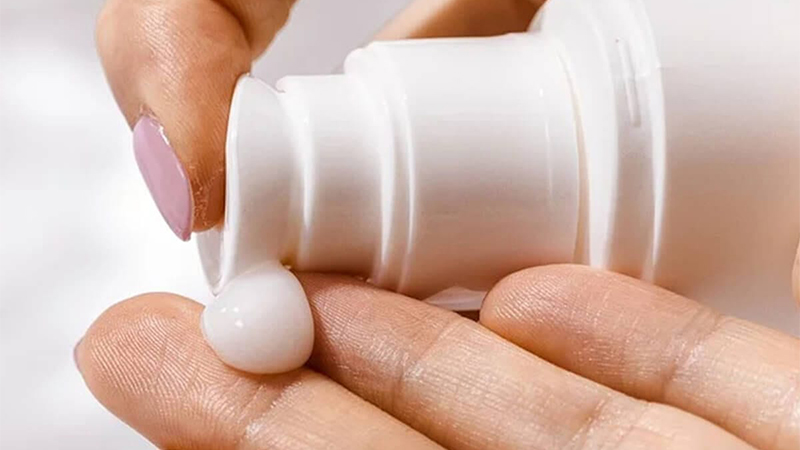
CBD topicals should be applied directly to the area of skin affected by eczema. First, you need to clean up the trouble spots and gently massage the product into your skin, as you would with any skin care treatment.
You can start with a small amount and test it on the inside of your wrinkles to see if it doesn’t trigger allergies.
Finding the best CBD dosage for eczema requires some experimentation. If you don’t feel any relief within 30–60 minutes from your first dose, apply a more liberal amount the next time – and reassess the effects.
Can CBD Cream Make Eczema Worse?
Some CBD creams for eczema may contain skin-irritating ingredients. Some terpenes or fragrances may cause allergies, so make sure to carefully read the product label before you buy CBD products for the skin.
Otherwise, these allergies can make your eczema worse. Again, it’s a good idea to run a patch test on the wrist before you continue with a larger amount.
CBD & Eczema FAQ
Here you’ll find the knowledge base that we’ve put together based on the most frequently asked questions about eczema from the Internet.
What is eczema?
Also known as atopic dermatitis, eczema is a common skin condition where the skin becomes itchy, dry, red, and cracked.
There are three main types of eczema:
- Nummular dermatitis – also referred to as discoid eczema, this type usually appears only on one part of the body, e.g. arms or legs.
- Contact dermatitis – triggered by an allergen that engages with the skin.
- Exfoliative dermatitis – triggered by an allergy to food or pollen and gets on the skin.
All three types cause inflammation and severe itching. If neglected, they can lead to serious complications.
What causes eczema?
There is no established cause of eczema, but several things are known to trigger flare-ups in many people.
The most common causes of eczema include:
- Hormone imbalances
- Malnourishment
- Allergies
- Sensitive skin
- Stress
The majority of eczema sufferers point to stress and allergies as the number one causes. People who use CBD cream for these conditions see significant improvements without the side effects of conventional treatments.
What are the symptoms of eczema?
The telltale symptoms of eczema include dry or flaky skin, redness that resembles a rash, bumps on the skin, fluid-filled blisters, and uncontrollable itching. Swollen glands in the armpits or groin area are also common.
How is eczema diagnosed?
Doctors are able to diagnose eczema and other skin conditions just by running a quick skin examination. However, it’s difficult to tell what type of eczema a person suffers from just by taking a look at their skin.
Your doctor will probably run a more detailed interview about your medical history, lifestyle, nutrition, and physical activity.
They may also take a sample from the fluid inside eczema blisters to detect any pathogens, such as fungi or yeast.
Does eczema get worse with scratching?
Yes, scratching is detrimental to eczema, and people who scratch their itchy skin during flare-ups admit that it makes the condition worse.
Scratching also increases the risk of getting a secondary infection that could have dangerous consequences.
Hard as it sounds, the best you can do is avoid scratching when you have eczema. Using CBD cream may help relieve itching and other symptoms.
How is eczema treated?
Eczema is classified as a chronic, recurrent skin condition. In other words, there is no cure for it.
However, there are treatments that can help you manage the symptoms and put eczema into remission.
You have the following options:
- Topical creams: these are skin care products like CBD cream; they’re applied directly to the skin to moisturize it, soothe itching, and reduce inflammation.
- Topical corticosteroids: these creams are prescribed by doctors for severe eczema symptoms. They shut down the skin’s immune system, so while they may help short-term, they’re not a viable long-term solution due to their side effects.
- Antibiotics: your doctor will recommend them to treat secondary infections from scratching eczema flare-ups.
- Moisturizers: these products are applied daily to help your skin maintain moisture.
- Oral corticosteroids: they’re used in extreme cases when all other treatments fail to control your eczema.
- Light therapy: your skin is exposed to different types of light for short periods to help reduce the appearance of eczema on your skin.
Most of these options have side effects. CBD cream has become a popular alternative because it almost has none. Many eczema sufferers use CBD creams because they make their skin feel better and help reduce the appearance of flare-ups.
CBD has long been known as a potent anti-inflammatory and analgesic, but more recent research points to it as a potential remedy for chronic skin conditions like eczema.
Can you use CBD cream for eczema during pregnancy?
The FDA strongly advises against using CBD cream during pregnancy, claiming the cannabinoid may harm fetal development. The administration doesn’t justify its decision with arguments other than “there’s not enough clinical research.”
Using CBD cream for eczema during pregnancy should be consulted with your ob-gyn. If the doctor doesn’t see any contraindications, they may recommend CBD cream because, unlike ingestible forms of CBD, topicals don’t reach the bloodstream, so there’s no risk of CBD penetrating the placenta.
Nevertheless, it’s better to err on the side of caution and ask your doctor if you can use CBD cream for eczema during pregnancy and breastfeeding.
Is CBD cream safe for children with eczema?
Since there are no studies done on the use of CBD cream for infants or children with eczema, every case should be discussed with a pediatrician.
However, as reported by the 2017 update on the safety and efficacy of cannabidiol in animals and humans, CBD is safe and well-tolerated even in doses reaching 1,500 mg daily.
How long does it take for CBD cream to work for eczema?
You should start to notice results between 3–5 days of using a CBD cream for eczema, although some people start seeing the benefits right away.
However, if you’ve had severe eczema for a long time, it may take longer for you to work because your skin needs more time to heal.
Can you apply CBD oil for eczema?
Yes, but that might be counterproductive. CBD oil is usually taken under the tongue to support the endocannabinoid system from the inside. It may help with stress, anxiety, and inflammation inside your body, but it’s not a good product to use topically.
CBD is best absorbed with fats, and topicals are known for their solid fatty bases. Using sheer CBD oil on the skin reduces its absorption rates, and you’ll end up wasting the precious CBD.
For best results, combine sublingual CBD use to promote healthy immune function with topicals to treat localized problems.
Summarizing the Best CBD Creams for Eczema
Although studies on people with eczema using CBD are limited, the available research is promising.
CBD may help relieve eczema symptoms, but it’s best used as a cream or another topical. You won’t effectively manage flare-ups with CBD oil; a dedicated topical formula will be more effective for the job.
When choosing the best CBD cream for eczema, make sure to choose all-organic products that have been tested by a third-party laboratory for CBD and potential contaminants.
Remember to check up with your doctor before trying CBD, especially if you’re pregnant or breastfeeding.
It’s also good to run a patch test before using a CBD cream on larger areas of your skin. Doing so will help you avoid allergies and further skin irritation.
Sources:
- Palmieri B, Laurino C, Vadalà M. A therapeutic effect of cbd-enriched ointment in inflammatory skin diseases and cutaneous scars. Clin Ter. 2019 Mar-Apr;170(2):e93-e99. doi: 10.7417/CT.2019.2116. PMID: 30993303. [1]
- Maghfour, J., Rietcheck, H. R., Rundle, C. W., Runion, T. M., Jafri, Z. A., Dercon, S., Lio, P., Fernandez, J., Fujita, M., Dellavalle, R. P., & Yardley, H. (2020). An Observational Study of the Application of a Topical Cannabinoid Gel on Sensitive Dry Skin. Journal of drugs in dermatology : JDD, 19(12), 1204–1208. https://doi.org/10.36849/JDD.2020.5464
- Maghfour, J., Rundle, C. W., Rietcheck, H. R., Dercon, S., Lio, P., Mamo, A., Runion, T. M., Fernandez, J., Kahn, J., Dellavalle, R. P., & Yardley, H. (2021). Assessing the effects of topical cannabidiol in patients with atopic dermatitis. Dermatology online journal, 27(2), 13030/qt8h50k2vs.
- Atalay, S., Jarocka-Karpowicz, I., & Skrzydlewska, E. (2019). Antioxidative and Anti-Inflammatory Properties of Cannabidiol. Antioxidants (Basel, Switzerland), 9(1), 21. https://doi.org/10.3390/antiox9010021
- Blaskovich, M.A.T., Kavanagh, A.M., Elliott, A.G. et al. The antimicrobial potential of cannabidiol. Commun Biol4, 7 (2021). https://doi.org/10.1038/s42003-020-01530-y
- Abichabki, N., Zacharias, L.V., Moreira, N.C. et al. Potential cannabidiol (CBD) repurposing as antibacterial and promising therapy of CBD plus polymyxin B (PB) against PB-resistant gram-negative bacilli. Sci Rep 12, 6454 (2022). https://doi.org/10.1038/s41598-022-10393-8
- Sundstrup, E., Jakobsen, M. D., Brandt, M., Jay, K., Colado, J. C., Wang, Y., & Andersen, L. L. (2014). Acute effect of topical menthol on chronic pain in slaughterhouse workers with carpal tunnel syndrome: triple-blind, randomized placebo-controlled trial. Rehabilitation research and practice, 2014, 310913. https://doi.org/10.1155/2014/310913 [7]
- Teo, C., Tay, S., Tey, H. L., Ung, Y. W., & Yap, W. N. (2021). Vitamin E in Atopic Dermatitis: From Preclinical to Clinical Studies. Dermatology (Basel, Switzerland), 237(4), 553–564. https://doi.org/10.1159/000510653
- Fowler, J. F., Nebus, J., Wallo, W., & Eichenfield, L. F. (2012). Colloidal oatmeal formulations as adjunct treatments in atopic dermatitis. Journal of drugs in dermatology : JDD, 11(7), 804–807.
- Alangari, A. A., Morris, K., Lwaleed, B. A., Lau, L., Jones, K., Cooper, R., & Jenkins, R. (2017). Honey is potentially effective in the treatment of atopic dermatitis: Clinical and mechanistic studies. Immunity, inflammation and disease, 5(2), 190–199. https://doi.org/10.1002/iid3.153 [10]
- Radha, M. H., & Laxmipriya, N. P. (2014). Evaluation of biological properties and clinical effectiveness of Aloe vera: A systematic review. Journal of traditional and complementary medicine, 5(1), 21–26. https://doi.org/10.1016/j.jtcme.2014.10.006
- Varma, S. R., Sivaprakasam, T. O., Arumugam, I., Dilip, N., Raghuraman, M., Pavan, K. B., Rafiq, M., & Paramesh, R. (2018). In vitro anti-inflammatory and skin protective properties of Virgin coconut oil. Journal of traditional and complementary medicine, 9(1), 5–14. https://doi.org/10.1016/j.jtcme.2017.06.012 [12]
- Hon, K. L., Kung, J., Ng, W., & Leung, T. F. (2018). Emollient treatment of atopic dermatitis: latest evidence and clinical considerations. Drugs in context, 7, 212530. https://doi.org/10.7573/dic.212530 [13]